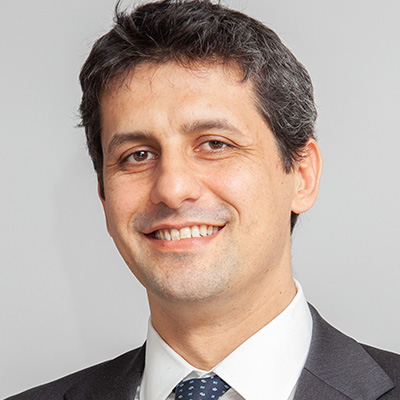Members' interviews
Interview with Simone Diodato Antonelli, Chair of our new Working Group on Electrification

12 February 2019

WindEurope’s Working Groups act as the brain of the association. Our Working Groups draft policy recommendations based on first-hand input from the industry, and have direct access to the institutions that design the EU regulatory framework of tomorrow.
This month, we bring you an interview with the chair of our new Working Group on Electrification: Simone Diodato Antonelli, Head of Regulatory Affairs for Central and Eastern Europe with Enel Green Power.
Can you tell our readers a little about your background in the wind industry?
I have been working for Enel since 2006. Since 2017, I’ve been the Head of Regulatory Affairs for Central and Eastern Europe of Enel Green Power.
During these years, I have seen the relevance of wind grow exponentially inside my company. Today it represents one of the major growth vectors for Enel. Enel Green Power is the subsidiary dedicated to the production of electricity from renewable energy sources. With almost 10 GW of wind-installed capacity, it is one of the main global wind players. It is present in 13 countries and is a benchmark for efficiency and appraisal in plant management.
Wind technology is becoming a major player in the energy sector: a reliable, affordable and clean source of energy. As a Board Member of WindEurope I’m proud to contribute to the further development of the wind sector and let it become the cornerstone of an efficient, decarbonised and resilient energy system, setting the path for the global energy transition.
You are chair of Europe’s Electrification Working Group. Can you tell us a bit about the significance of electrification, and why a Working Group like this is important?
The Electrification Working Group is launching highly relevant work on one of the pillars of the current transformation of the energy sector towards fast and full decarbonisation.
The renewables-based electrification of actual energy demand (mobility, heating and cooling, industries, etc.) will reduce the global greenhouse gas emissions of the energy sector and reduce dependency on extra European fuel imports. But it will also strongly improve the system’s resilience, since energy will lose its tendency towards volatility and gain long-term stability. In fact, unlike fossil fuels, renewables will not be affected by the instability of hydrocarbon prices.
Increasing electrification will also help to integrate faster, larger shares of variable generation in the electric system, matching better supply with demand. Electrification and sector-coupling can enhance demand responsiveness and ensure demand is better aligned with renewables production periods, allowing for an even higher share of renewables in the electric system.
However, these benefits are not automatic: let’s think about the uncoordinated use of renewables and electric cars. This could increase costs and capacity requirements and could even be destabilising to the power system. Coordination and increased flexibility (through the development of demand side response programs, storage, smart grids and digital technologies) is essential to reduce the dependence on carbon-intensive back-up generation. Much flexibility also lies in heating and cooling for residential buildings, where demand can be shifted to different periods within the same day. The physical network will have to modernise, in terms of its infrastructure, as well as in its operations and system management.
To do this, policy and regulation remain essential to shaping the industry’s future. It is in fact a very tough political challenge: costs are up-front and benefits are delayed. We will require effective policies and regulation as well as close cooperation between policymakers and different private sectors who are not used to working together.
Who should take an interest in this Working Group, and why?
As I said at the beginning, this Working Group has a very relevant topic to discuss. A topic that is already occupying much of the EU energy debate. It is time for WindEurope to contribute to this debate, explaining the social benefits, promoting renewables-based electrification in Europe and developing policy recommendations for an efficient transition based on wind power and electrification.
Many competent actors are developing studies to identify the electrification potential of transport, building and industrial sectors, and to help identify the most promising electrification technologies. We have to ensure that wind, as a proven mature and efficient technology, is at the core of this process. We can do this by addressing a number of questions: what elements (i.e. framework, infrastructures, and tax schemes) are vital to support of the transition to a primarily wind-based electrified system? How can we make sure the transition is economically and socially sustainable? What may be the challenges of very high wind penetration (system security, public acceptance, etc.)?Many may think that this activity will only be relevant in the distant future. They think this will have a limited impact on business decisions in the short term. This is simply not the case.
If we look at renewables, 10 years ago they were referred to as ‘alternative’ forms of energy, unreliable and too expensive, and incapable of taking on a real role. Now we know that the story is completely different. The installed capacity of renewables has continued to increase and investment has grown significantly. As has been the case with renewable sources, when we talk about electrification, we are not talking about something in the distant future, but a situation that could soon materialise before our very eyes.
We have to deliver today; we cannot miss the opportunity to make the electrification process an opportunity for further growth in the wind sector.
If we look ten years ahead, what role do you see electrification playing in the development of Europe’s energy mix?
The transformation of the European economy into a fully electrified sector is not an aim in itself. It is rather an attempt to answer some of the most difficult challenges of our times: the decarbonisation of the economy, the reduction of noise and pollution in cities, the increasing energy resilience of our systems. Technological progress is revolutionising the way we produce, distribute and consume energy. It is also offering a ready solution to face these challenges – electricity.
Not because electricity is ‘nice’ or because it is in line with this or that view, strategy, or economic commitment; but because electricity, coupled with strong renewables development, is today the most efficient, sustainable and competitive form of energy.


